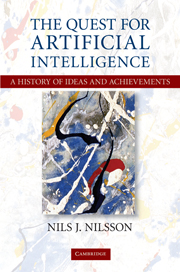Book contents
- Frontmatter
- Contents
- Preface
- PART I BEGINNINGS
- PART II EARLY EXPLORATIONS: 1950S AND 1960S
- PART III EFFLORESCENCE: MID-1960S TO MID-1970S
- 9 Computer Vision
- 10 “Hand-Eye” Research
- 11 Knowledge Representation and Reasoning
- 12 Mobile Robots
- 13 Progress in Natural Language Processing
- 14 Game Playing
- 15 The Dendral Project
- 16 Conferences, Books, and Funding
- PART IV APPLICATIONS AND SPECIALIZATIONS: 1970s TO EARLY 1980s
- PART V “NEW-GENERATION” PROJECT
- PART VI ENTR'ACTE
- PART VII THE GROWING ARMAMENTARIUM: FROM THE 1980s ONWARD
- PART VIII MODERN AI: TODAY AND TOMORROW
- Index
- Plate section
16 - Conferences, Books, and Funding
Published online by Cambridge University Press: 05 August 2013
- Frontmatter
- Contents
- Preface
- PART I BEGINNINGS
- PART II EARLY EXPLORATIONS: 1950S AND 1960S
- PART III EFFLORESCENCE: MID-1960S TO MID-1970S
- 9 Computer Vision
- 10 “Hand-Eye” Research
- 11 Knowledge Representation and Reasoning
- 12 Mobile Robots
- 13 Progress in Natural Language Processing
- 14 Game Playing
- 15 The Dendral Project
- 16 Conferences, Books, and Funding
- PART IV APPLICATIONS AND SPECIALIZATIONS: 1970s TO EARLY 1980s
- PART V “NEW-GENERATION” PROJECT
- PART VI ENTR'ACTE
- PART VII THE GROWING ARMAMENTARIUM: FROM THE 1980s ONWARD
- PART VIII MODERN AI: TODAY AND TOMORROW
- Index
- Plate section
Summary
Accompanying the technical progress in aptificial intelligence during this period, new conferences and workshops were begun, textbooks were written, and financial support for basic research grew and then waned a bit.
The first large conference devoted exclusively to artificial intelligence was held in Washington, DC, in May 1969. Organized by Donald E. Walker (1928–1993) of the MITRE Corporation and Alistair Holden (1930–1999) of the University of Washington, it was called the International Joint Conference on Artificial Intelligence (IJCAI). It was sponsored by sixteen different technical societies (along with some of their subgroups) from the United States, Europe, and Japan. About 600 people attended the conference, and sixty-three papers were presented by authors from nine different countries. The papers were collected in a proceedings volume, which was made available at the conference to all of the attendees.
Because of the success of this first conference, it was decided to hold a second one in London in 1971. During the early years, organization of the conferences was rather informal, decisions about future conferences being made by a core group of some of the leaders of the field who happened to show up at organizing meetings. At the 1971 meeting in London, I left the room for a moment while people were discussing where and when to hold the next conference.
- Type
- Chapter
- Information
- The Quest for Artificial Intelligence , pp. 202 - 206Publisher: Cambridge University PressPrint publication year: 2009



